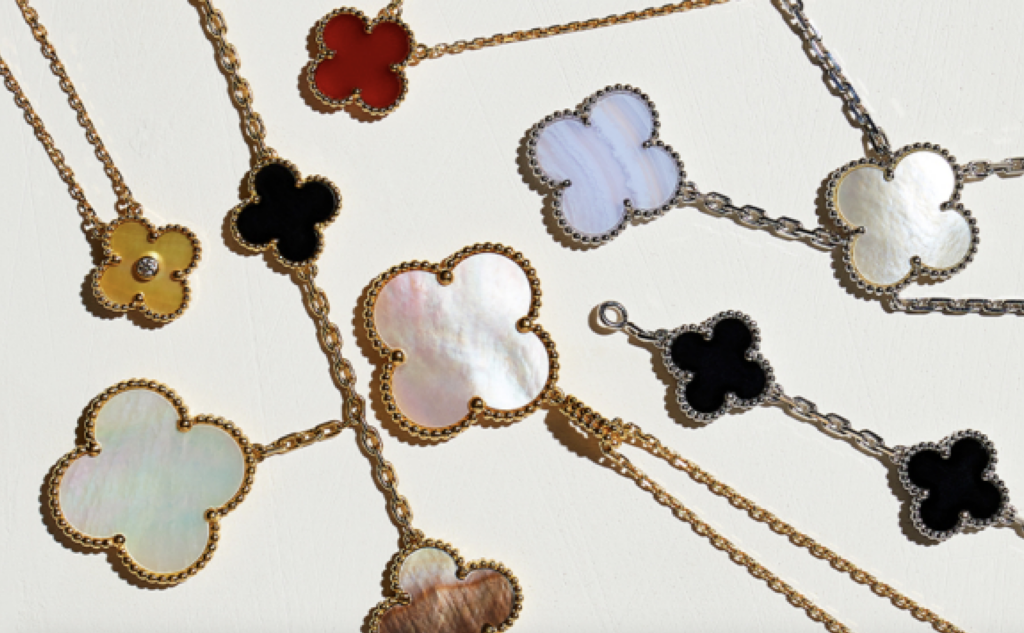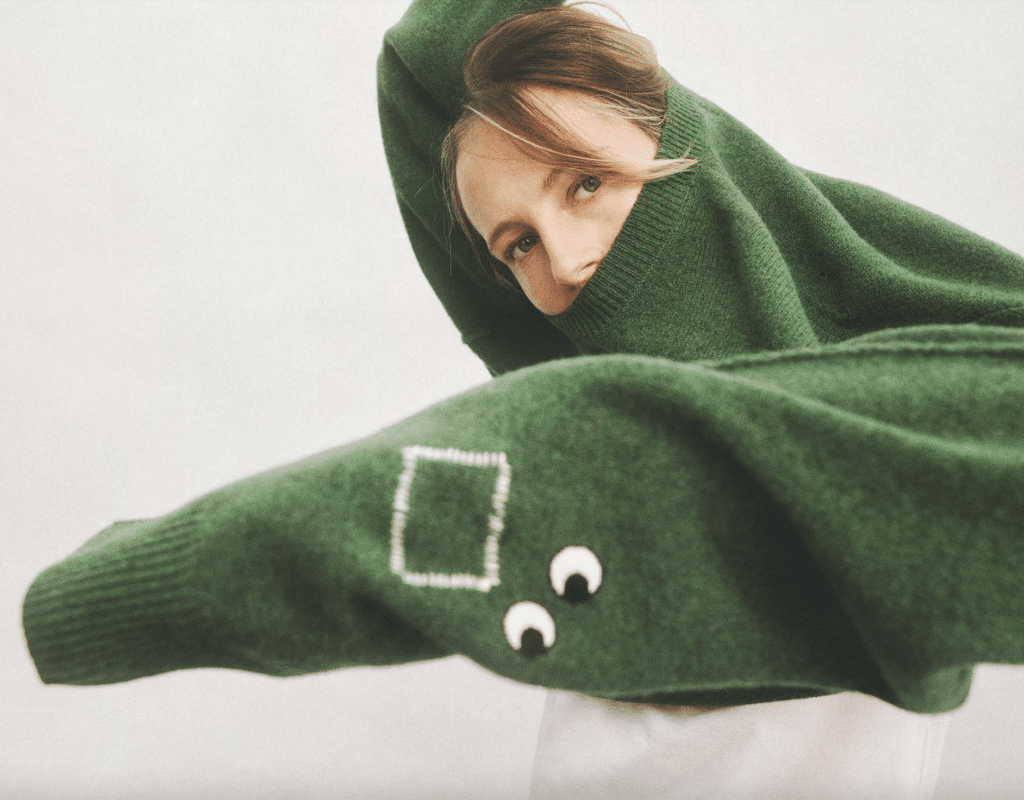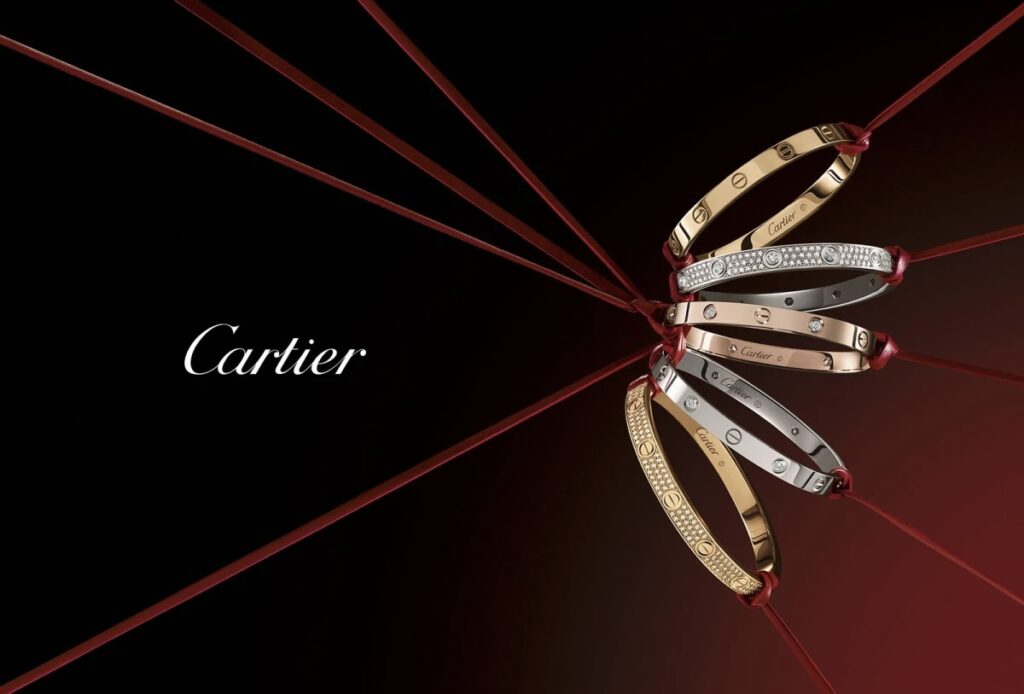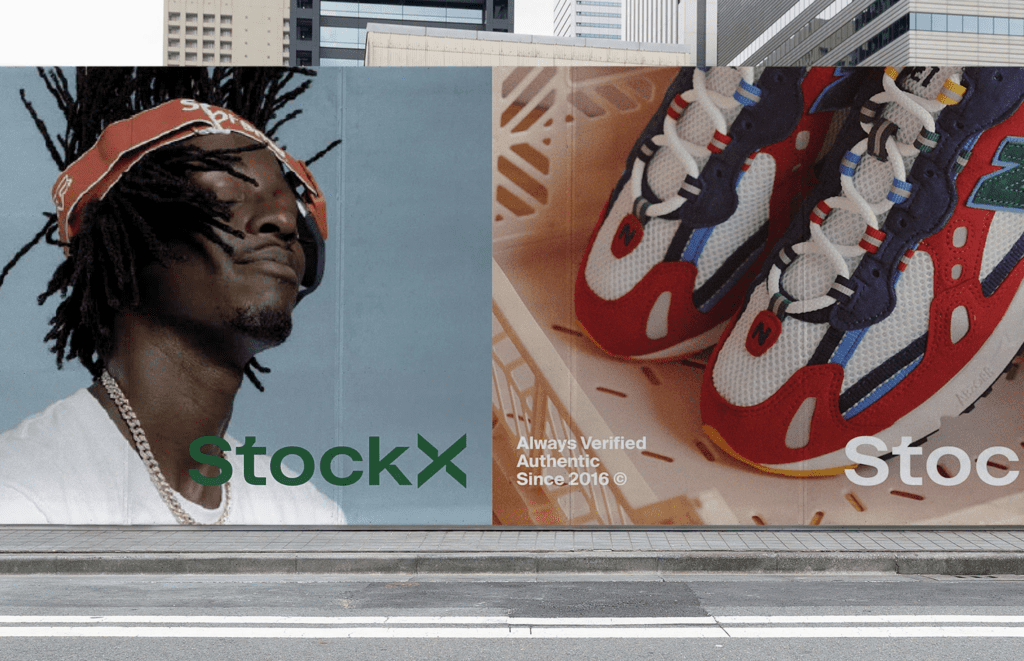The U.S. Patent and Trademark Office’s Trademark Trial and Appeal Board (“TTAB”) has an array of interesting matters on its plate for 2023 – from Dior’s quest to shut down an application lodged by adult film star Gigi Dior to a Nike-initiated opposition over “Just Dao It” for use in connection with an “on-line community for gamers [and] NFT gurus.” (On the heels of the TTAB granting Nike’s request to extend time to oppose the web3-focused mark, the Swoosh filed its opposition on January 11.) With so many striking proceedings under way before the trademark body, which handles appeals involving applications to register trademarks, reexamination proceedings involving registrations, trial cases of various types involving applications or registrations, etc., we take a look at three pending proceedings that worth keeping an eye on in 2023 …
Nike’s SNKRS Trademarks
Following a hearing before the TTAB in September, a matter over two Nike trademark applications is slated for a final decision in 2023. In two trademark applications, which it lodged with the USPTO in January 2020, Nike is seeking to register a pair of SNKRS-centric trademarks for use in connection with: (1) “Operating an online marketplace featuring footwear and clothing; on-line retail store services featuring footwear and clothing; retail store services featuring clothing and apparel; Pop-up retail store services featuring clothing and footwear; providing consumer product information and related news in the field of sneakers”; and (2) “Providing recognition and incentives by the way of awards and contests to demonstrate excellence in the field of fashion and sneaker collection.”
One of the applications (Serial No. 88781470) features the SNKRS word mark, while the other (Serial No. 88781464) consists of a stylized SNKRS along with the Nike swoosh logo.
USPTO examiners refused to register either of the marks on the basis that SNKRS is “generic,” or alternatively, it is “merely descriptive and has not acquired distinctiveness in connection with Nike’s services,” prompting Nike is seek reconsideration and ultimately, appeal the examiners’ findings to the TTAB, arguing that the examining attorneys had not met “the heavy burden of proving that SNKRS is generic for the Class 35 and 41 services,” and that it has sufficiently demonstrated that SNKRS has acquired distinctiveness in Classes 35 and 41.
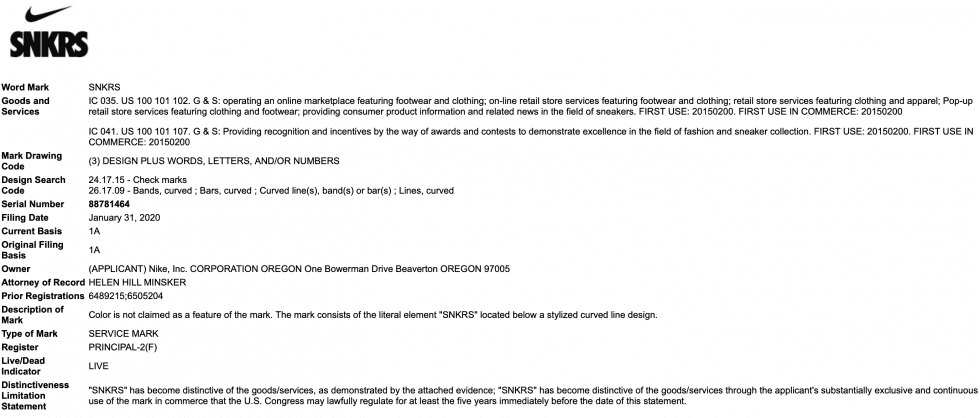
Among other things, Nike asserted in the April 2022 appeal brief that filed with the TTAB that since it launched SNKRS with “great fanfare at the 2015 NBA All Star Week,” the platform has been “phenomenally successful, and is “one of the most popular and renowned shopping platforms” in operation. In particular, Nike argues that SNKRS has garnered more than 11.5 million active users and more than 1.15 billion visits as of only May 2021. Still yet, Nike claims that consumers placed more than 10 million orders through the SNKRS platform as of 2019, and that a consumer survey revealed that 62 percent of respondents “identified SNKRS as a brand name, compared to only 26 percent that answered it is a common name.”
As for the USPTO’s examining attorneys, Nike has argued that they have not presented any “objective evidence of consumer perception that ‘SNKRS’ is the phonetic equivalent of ‘sneakers’ or that consumers only perceive ‘SNKRS’ as a generic term for footwear or sneakers,” and in finding that SNKRS is generic for the goods/services at issue, they fail to “give adequate weight to the voluminous evidence demonstrating that consumers already perceive SNKRS as a trademark.”
Dior v. GIGI DIOR
Christian Dior made headlines this year after initiating an opposition proceeding over a trademark application for registration filed by adult film star Stephanie Hodge – who is professionally known as Gigi Dior – for her stage name for use on “entertainment services, namely, personal appearances by a porn star; Entertainment services, namely, providing a web site featuring non-downloadable adult-themed photographs and videos.” In the notice of opposition that it lodged with the TTAB in October, Dior argued that as a result of “substantial sales and extensive advertising and promotion,” it has established “valuable goodwill” in its arsenal of Dior trademarks, which are “distinctive and famous.” In particular, Dior points to trademark registrations for its name for use in Classes 25, 14, and 18, as well as “common law trademark rights in the DIOR marks.”
Beyond that, counsel for the LVMH-owned brand has asserted that based on “the duration, extent, and nationwide reach of advertising and publicity” of the DIOR trademarks, as well as its “extensive sales of goods under the DIOR marks for many years,” the Dior marks “are widely recognized by the general consuming public of the U.S. as a designation of the source of [its] goods.”
Against this background, Dior claims that the value of its trademarks and the goodwill associated with them is at risk in light of the likelihood that consumers will “incorrectly believe” that the services offered under the Gigi Dior mark are “sponsored, approved, or emanate from [Dior]” or that the two parties are in some way connected/affiliated when they are not. In addition to confusion, Dior alleges that Hodge’s use and registration of the Gigi Dior mark “will impair the distinctiveness of the DIOR marks and consumers’ ability to identify the goods of [Dior], thereby causing dilution by blurring,” and is also “likely to convey or suggest an association that harms the reputation of the famous DIOR mark, thereby causing dilution by tarnishment.” As such, Dior is looking to get the TTAB to block the registration for the Gigi Dior mark.
VETEMENTS
The SNKRS proceedings are not the only ones set for a final decision in 2023; fashion brand Vetements is looking for a win from the TTAB this year in its quest to amass registrations for its name for use on apparel and “online retail store services for shirts; skirts; sweaters,” etc. Vetements lodged requests for reconsideration with the TTAB after USPTO examiners refused to green-light two of its VETEMENTS applications because when used in Classes 25 and 35, VETEMENTS – which means “clothing” in English – is generic under the doctrine of foreign equivalents.
On the heels of the USPTO refusing to reconsider the refusals, Vetements appealed the examiners’ findings to the TTAB. In its August appeal brief, the Demna and Guram Gvasalia-launched brand argues that, among other things, the USPTO examiners erred in applying the doctrine of foreign equivalents, which “should be applied only when it is likely that the ordinary American purchaser would stop and translate the word into its English equivalent.” That is not the case here, per Vetements, which claims that the ordinary American purchaser is not likely to stop and translate the VETEMENTS mark into its English equivalent, particularly given that “the French language is not commonly spoken in the U.S.”
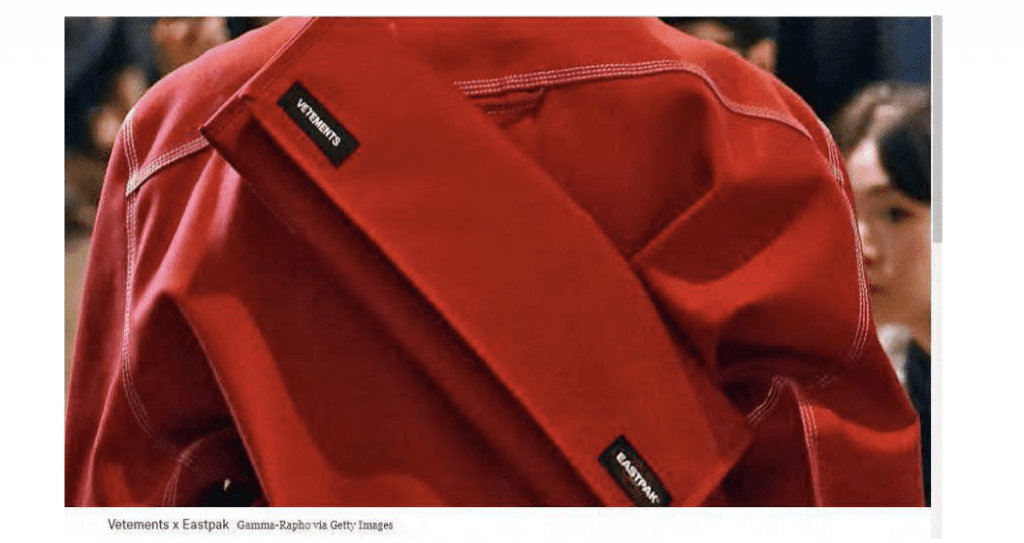
Additionally, Vetements alleges that its mark is routinely displayed in a manner that “would readily be perceived as a trademark, rather than as describing the goods and/or services.” For example, the VETEMENTS mark “displayed on an article of clothing (e.g., a t-shirt) would be perceived as a trademark (e.g., brand name or label) rather than as describing the article of clothing.” Still yet, when considered in its entirety, Vetements claims that its mark is “not merely descriptive (nor generic) of [its] goods and services,” as if the mark “requires imagination, thought or perception to reach a conclusion as to the nature of the goods or services to which it is applied, then the mark is a suggestive mark and not a descriptive term.”
That is relevant here, the brand contends, as the word “vetements” does not “convey an immediate idea to the nature of [its] goods and services” and instead, creates a “commercial impression … that is more than the individual meaning of the component word.”
In reality, Vetements argues that its mark – which has been the subject of “overwhelming, use, sales, promotion, and recognition over the years throughout both the fashion industry and by consumers in the U.S. and elsewhere around the globe” – has acquired distinctiveness “in relation to the named goods or services,” making it registrable. In addition to engaging in extensive marketing, participating in “a significant number of collaborations with leading global companies, which has resulted in extensive exposure, sales, and recognition by the purchasing public,” and being the subject of widespread unsolicited media attention, Vetements points to wholesale sale of its offerings over $31 million and retail value of over $ 95 million since 2016 as evidence of secondary meaning.
And finally, in urging the TTAB to register its trademarks, Vetements states that the lack of actual confusion with other marks “further demonstrates the registrability of [the VETEMENTS] mark.”
JUST DAO IT
Nike is looking to block the registration of a trademark that plays on its famed “Just Do It” slogan. In the opposition that it initiated with the TTAB on Jan. 11, counsel for Nike asserts that the sportswear giant stands to be damaged if Tacvue, Inc.’s application for JUST DAO IT is registered by the trademark office. The Chicago-based tech company revealed in its October 27, 2021 application that it intends to use the mark in connection with “computer services, namely, creating an online community for registered users” – including “gamers [and] NFT gurus” – to “participate in discussions, get feedback from their peers, form virtual communities, engage in social networking, play games,” etc.
Nike is pushing back against Tacvue’s web3-centric trademark application, asserting that JUST DAO IT is confusingly similar to the JUST DO IT mark, which it has continuously used since “at least as early as 1989 in connection with various clothing items” and for which it maintains federal registrations and common law rights. Not limited to tangible goods and services, such as apparel and footwear, Nike argues that its rights in the mark extend to the digital world, as it has “long used JUST DO IT on social media to build community and to connect with” consumers. At the same time, Nike says that it uses its trademarks in connection with “downloadable mobile applications … that offer social networking, community-building, and/or interactive feedback elements.” For example, through its NIKE RUN CLUB App, Nike contends that it “offers programs that allow Nike customers to ‘connect with friends and other runners through experiences and challenges.’”
*This article was initially published on Jan. 2, 2023, and has been updated to reflect Nike’s filing of an opposition to the JUST DAO IT mark.











